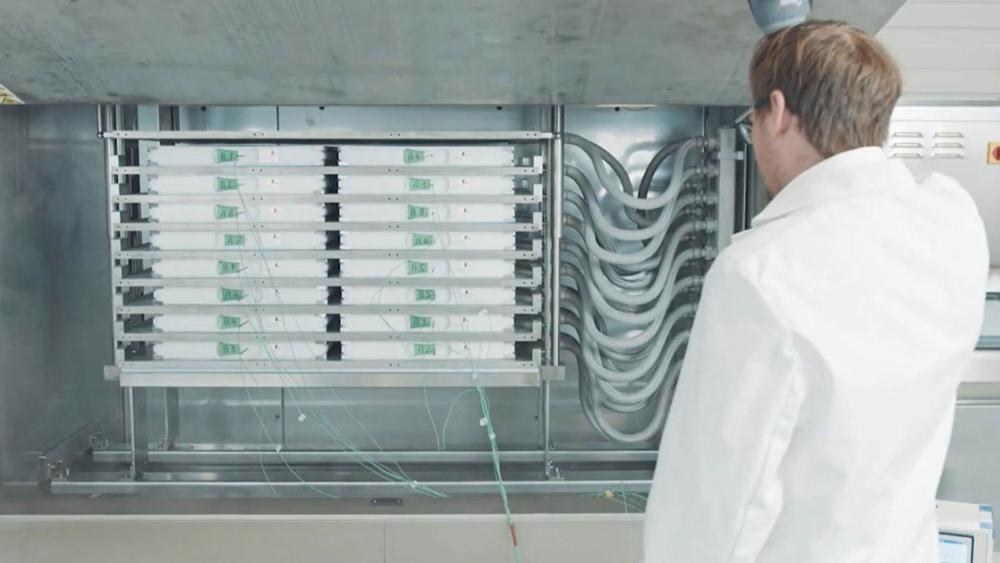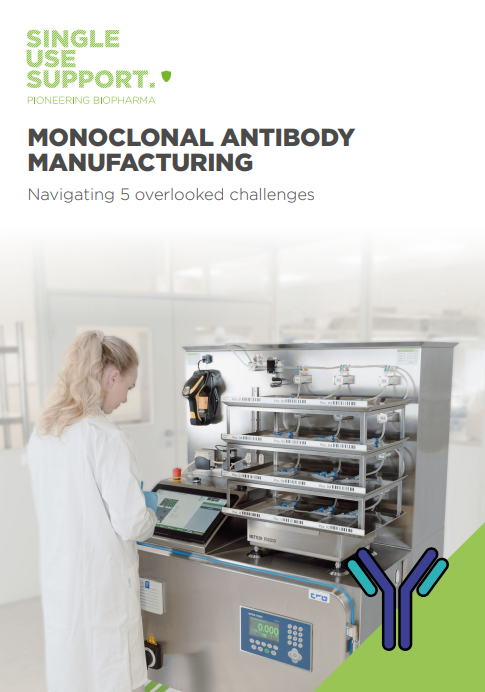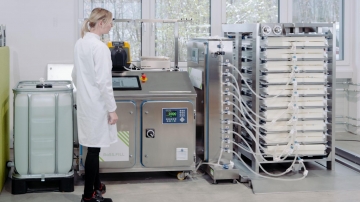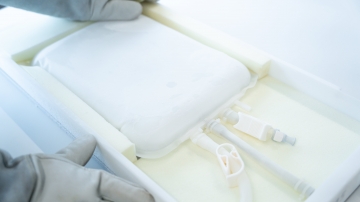Evaluating freeze-thaw processes in antibody production
Table of contents
ShowMonoclonal antibodies: Improved quality and better results thanks to controlled freezing and thawing
In a field as sensitive as biopharmaceutical development and production, controlled processes and procedures have always played a vital role and will continue to do so. This is especially true for highly delicate substances such as monoclonal antibodies derived from white blood cells: The monoclonal antibody production process may involve critical steps like freezing and thawing processes. They require particular care and sensitivity – as well as the logistics process, in order not to be compromised in their efficacy. Speedy freezing and thawing rates can add to improved levels of quality and lead to better overall results.
What makes monoclonal antibodies so special – and delicate to deal with?
Antibodies in general and monoclonal antibodies in particular have proven to be valuable tools in life sciences, thanks to some unique features. As they are able to bind to specific epitopes, they can be used for therapeutic but also for diagnostic purposes (e. g. ELISA assays). Their importance has increased significantly ever since they were first approved by the FDA in 1986.1
As opposed to polyclonal antibodies, monoclonal antibodies have the added benefit of being derived from the same lineage. This means their results can be reproduced endlessly by always resorting to aliquots of the same original batch. This last fact notwithstanding, production and the general handling of any kind of antibody are complex processes and require an environment that is both sterile and controllable. After all, antibodies are protein-based and at high risk of deterioration in ex vivo environments.
Temperature is therefore one of the most essential parameters to consider along the production process, from development all the way to the final administration, including centrifugation, freeze-thaw cycles, multiple handling steps such as dilution to final concentration at room temperature, storage, shipping as well as thawing after long-term storage conditions. All these procedures are equally important in order to guarantee the best possible result for the patient.1

The benefits of freezing antibodies at a fast rate
With solutions and substances as delicate as blood cells and the antibodies derived thereof, the type of freezing process employed can have a major impact on their final quality, even if preservatives and cryoprotectants (e. g. sodium azide, glycerol) are added to antibody solutions contained in vials. The freezing speed affects both the frozen substance’s homogeneity and viscosity: With virtually any traditional freeze and thaw processes, parts of the substance will always show less activity based on the stress it is exposed to during freezing and thawing. An adequate freezing and thawing rate is thus a key parameter for achieving homogenous results without a major loss of active antibody concentration, hence quality.
Various tests have confirmed that a consistently high freezing velocity - which can be achieved with progressive single-use platforms - leads to a significantly lower level of Cryoconcentration (the protein concentration in the solid or liquid parts of a partially frozen mixture), denaturation and formation of aggregates. As a logical consequence, the original characteristics of the substance to be frozen will be better preserved when processed at a speedy and consistent freezing/thawing rate. We implement this with our laboratory freezer, pharma freezer and cryogenic freezer.
More about freezing and thawing drug substances: Freezing drug substance | Thawing drug substance | Regulations for Cryoprotectants in ATMP Cryopreservation
The risks of slow freezing in monoclonal antibody production
Slow freezing, on the other hand, is primarily characterized by differing freezing rates with a possibly adverse impact on the drug substance’s quality. A slower freezing process leads to the formation of longer ice crystals, which can negatively affect antibody storage. The formation of crystalline structures furthermore causes tension, which in turn can destroy up to 20 % of all contained proteins, without the presence of any protease enzymes! And as the cold temperatures penetrate the substance from the outside in, this can lead to an expansion of the core with the result of harming or destroying the surrounding material.
Furthermore, the slow freezing rates offered by static freezers lead to increased levels of Cryoconcentration. In the worst case scenario, this can lead to the destruction of a high number of antibodies caused by friction and rupture. Highly concentrated substances such as mAb, however, require a homogeneous freezing process in order to maintain the original quality in the best way possible.

Thawing in the monoclonal antibody production process
Thawing monoclonal antibodies poses similar challenges and requirements that are to be mastered in order to preserve the structural and therapeutic integrity of these delicate biopharmaceuticals. As the frozen antibodies transition to a liquid state, the risk of stress-induced damage looms large.
Controlled thawing becomes paramount: Too fast or too slow, uncontrolled freezing rates may cause damage to the antibody structure. Factors such as temperature fluctuations and extended thawing times can become silent adversaries, potentially destabilizing the molecules. Harnessing advanced thawing technologies and adhering to stringent protocols become not just best practices but indispensable safeguards.

Download Guide
Navigating 5 Overlooked Challenges in Monoclonal Antibody Manufacturing
What about mAb storage conditions?
Antibody freezing and thawing can have an enormous impact on product quality. However, what happens in between is just as critical and demands adherence to strict guidelines: monoclonal antibody storage and transport.
Central to – especially long-term – preservation of mAbs is storage temperature, demanding meticulous attention to prevent even minor deviations. Furthermore, repeated freeze/thaw cycles are to be avoided, which require thorough planning of which products are to be kept in refrigerators for short-term storage while others are subjected to ultra-low-temperatures.
Many companies that manufacture monoclonal antibodies provide detailed data sheets on their respective products, including storage recommendations that one is usually best advised to follow. Proper storage conditions may vary; however, maintaining them is vital to ensure that the preserved antibodies are suited for diagnostics, in vivo studies, or therapeutic applications.
Other possible damages due to freezing and thawing of antibodies
When freezing and thawing monoclonal antibodies, insufficient processes pose severe risks due to the considerable physical stress that the proteins are subjected to. Freeze-thaw damage due to effects like cryoconcentration, which can alter the structure of monoclonal antibodies, are to be avoided. This requires precise control over freezing and thawing rates, which have to comply with the freezing profile of the drug substance in question.
As already stated, repeated freeze-thaw cycles may prove detrimental to antibody quality and lead to loss of activity. One feasible approach is to choose small aliquots in order to flexibly access mAbs.
Cryoprotective agents may be used to alter freezing point and behavior, especially for enzyme-conjugated antibodies like HRP-linked antibodies. Antimicrobial agents like BSA or sodium azide can be used as well, but are not suitable in every scenario. Sodium azide, for example, might affect the potential of conjugation and disturbs the cytochrome electron transport system in many organisms. Therefore, dialysis or gel filtration may be performed to remove it from the solution.2 3
Considering the varying kinds of antibodies and respective fields of application, customizable techniques and technologies are to be adopted in order to fully cater to unique process requirements in mAb production.2 3
New opportunities and chances: Freezing and thawing mAb with next-level technology
The implementation of single-use technology in the biopharmaceutical industry is growing rapidly, not least because of increased yields, the adaptability of disposable components, and the acceptance of personalized therapies and medical compounds. On top of that, single-use platforms facilitate a rapid production of clinical trial material, monoclonal antibody reagents for western blotting, and cell as well as gene therapies.
Single-use technologies are highly flexible and scalable; thus, they offer the ideal solution for processing antibodies, cells and genes in a variety of volumes. Innovative approaches open up new formulation opportunities that would not be possible with traditional systems, tried-and-tested as they may be.
Read more: Trends in monoclonal antibody production: Optimizing processes with single-use technology
The growing range of therapies and compounds calls for plants and systems that are or can be adapted to the increased speed of development and production, as well as constantly changing requirements. In the case of monoclonal antibodies, special focus should be put on viscosity: As a result of protein-protein interactions, concentrated mAb solutions can exhibit high levels of viscosity that may pose challenges during the manufacturing process.
However, viscosity tests conducted by Single Use Support have shown that the degree of viscosity does not impact the filling process. Nonetheless, with RoSS.FILL, the speed and force of liquid throughput can be regulated and adjusted to the respective product conditions. This allows for individually controlled filling processes before the highly sensitive substances can be sent on to the freezing process with RoSS.pFTU.
RoSS.pFTU is an advanced plate freezing platform that can freeze and thaw monoclonal antibodies in several batch sizes. It allows extended control over the freezing rate, enabling researchers to carry out freeze-thaw processes that comply with the freezing profile of different drug substances. Along with the flexibility of this platform, its precision and efficiency contribute to an optimized production of top-notch antibody products.
FAQ
What happens when you freeze antibodies?
Freezing antibodies involves subjecting them to sub-zero temperatures, often performed for their preservation. However, this procedure is not without consequences. The freezing process can lead to the formation of ice crystals, potentially altering the structural integrity of antibodies. This structural change may impact the binding efficacy and overall functionality of the antibodies, making it necessary to establish suitable freeze-thaw processes suitable for the preservation of antibodies.
Can you refreeze antibodies?
Refreezing antibodies is generally not recommended. To maintain optimal functionality and stability, it is advisable to avoid refreezing antibodies.
Does freeze/thaw affect antibodies?
Yes, freeze/thaw processes can affect antibodies if not performed accordingly. The transition from a frozen to a liquid state and vice versa can introduce stress on the delicate structure of antibodies. Ice crystal formation during freezing and the subsequent thawing process can lead to alterations in the structure, potentially resulting in a loss of activity. It is therefore vital to keep control over parameters like freezing curves and time, as well as storage conditions.
- A Single-use Strategy to Enable Manufacturing of Affordable Biologics, http://dx.doi.org/10.1016/j.csbj.2016.06.007, Published 2016-07-06
- Antibody Shelf Life/How to Store Antibodies, http://dx.doi.org/10.13070/mm.en.2.120, Published 2013-10-31
- Antibody Storage and Handling – GaoLab, https://drexel.edu/~/media/Files/medicine/drexel-pdfs/labs/gao/Drexel_Gao_Lab_Antibody_Storage_and_Handling.ashx?la=en, Published










